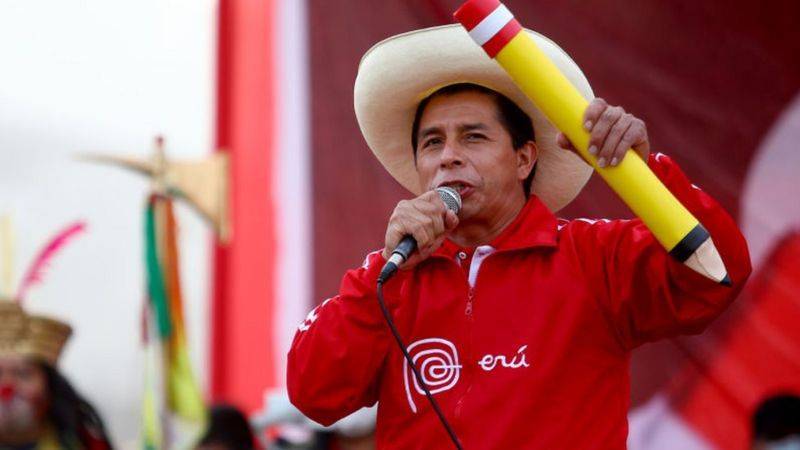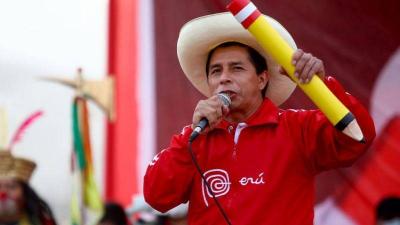After a long electoral process filled with tension, Pedro Castillo was sworn in as President of Peru. His victory shook the political and business elite in a highly polarized country severely affected by the pandemic. Pedro Castillo was born in a small village in one of the poorest regions of Peru and helped his illiterate parents by working on the farm during his childhood. As a young student, he had to walk for over two hours to reach school. Castillo worked as a teacher for 25 years and was also a union leader. In a rapid rise to power, despite his limited experience, he was elected President of Peru in 2021, driven by votes from rural citizens with whom he grew up.
Castillo's recurring message at election rallies was, "We will not remain poor in a rich country!" as he expressed the frustrations of his impoverished constituents. He portrays himself as a man of the people, rarely appearing at rallies without his traditional regional hat and a huge pencil, which symbolizes his Marxist party "Free Peru" and also represents his educational background. Castillo stated that governance in his country had never been in favor of the vast majority, calling for "radical changes" to address poverty and inequality, including the controversial commitment to draft a new constitution.
Castillo's opponents attempted to depict him as a far-left extremist with ties to communist guerrilla groups, allegations he denies. Although Castillo offered more moderate approaches, his critics remain concerned that some of his plans could undermine one of the most stable countries in Latin America.
Born as the third of nine children in Chota on October 19, 1969, Castillo worked as a primary school teacher from 1995 to 2020. He began his political life in 2002 when he ran for mayor unsuccessfully and first came to prominence in 2017 during a teachers' strike over wages and performance assessments. Even though he was not widely known in the cities, he became a candidate in this year's presidential elections and unexpectedly won the first round, surpassing 17 other candidates. He continued until he defeated Keiko Fujimori, the daughter of former president Alberto Fujimori and a favorite among business leaders.
After a counting process that lasted weeks and witnessed several challenges from the Fujimori camp, Castillo’s victory was confirmed by just a 44,000-vote majority. He said, "The time has come to invite sectors of society to build together... an inclusive Peru, a fair Peru, a free Peru." Castillo succeeded in capturing the attention of many Peruvians weary of corruption scandals that had overshadowed politics for years. However, he now faces the tougher part of the task.
Peru suffers from the highest COVID-19 death rate in the world, and the economic crisis has pushed millions into poverty. Castillo plans to increase mining taxes to fund public services like education and health, which the pandemic revealed to be deficient, and he aims to create one million new jobs in a year. He has softened some of his more radical positions, such as proposing to nationalize key economic sectors like mining, oil, hydropower, and gas, promising to respect private property.
One of his key promises is to call for a referendum on a council to write a new constitution to replace the current text enacted in 1993 during Alberto Fujimori's era. Castillo called for a document "that contains the color, scent, and flavor of the people." He will have to deal with a divided Congress, as his proposal regarding the constitution faces resistance. Castillo is also a Catholic and strongly opposes gay marriage and abortion. He is married to Lilia Paridés, who is also a teacher, and they have two children. The family moved to the capital, Lima, shortly before Castillo's inauguration, which coincided with the second centenary of Peru's independence. Castillo stated that he would not seek wealth from his position, pledging to earn only the salary equivalent to what he received as a teacher.




